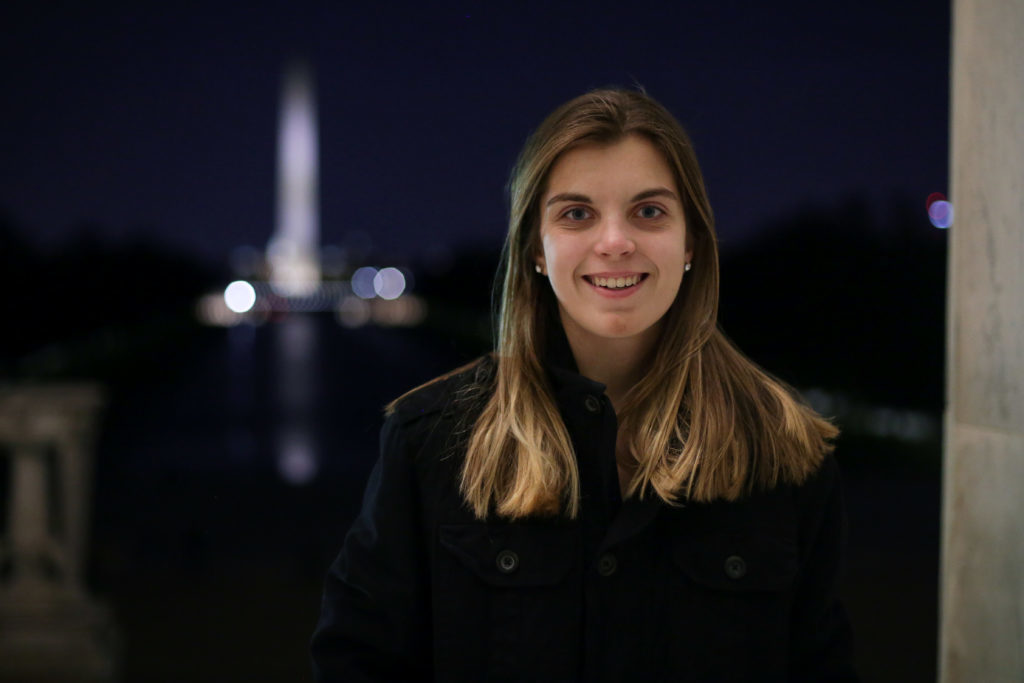A student is hoping to rally the student body behind a push to establish D.C. as the 51st state.
Sophomore Elizabeth Irons – who relaunched the GW chapter of Students for D.C. Statehood last month – said she has been working with students to increase awareness about the District’s lack of representation in Congress and efforts to make D.C. a state. She said advocacy is especially important as the country approaches midterm elections next month so students will vote for politicians with pro-D.C. statehood views.
“It’s the perfect moment where students are more into activism than anytime before,” Irons said. “Having another organization that promotes activism and one that’s more localized to our area itself, it seemed like the right time.”
A bill for statehood currently has 175 co-sponsors in the House, while equivalent legislation in the Senate has 29 co-sponsors. Eighty-six percent of D.C. residents approved a referendum two years ago outlining the proposed state’s constitution and boundaries, but Congress has yet to pass the bill approving statehood.
GW’s student organization will join seven already-established chapters at other D.C. institutions, like Georgetown, Howard and American universities. Irons said she collaborates weekly with schools to plan joint lobbying events, which can help students gain real experience in lobbying and organizing.
“Considering the nature of students here at GW, it’s such a beneficial thing to get involved in because it’s practice doing something a lot of students here study,” she said. “It’s practice lobbying and practice reaching out to local politicians and federal level politicians as well. It’s a first-hand experience at grassroots organizing.”
Irons said she sets up tables in Kogan Plaza or District House about once a week to collect student signatures to add them as members of the organization. Students across the District wrote letters advocating for statehood to Congress and the White House at an event on Sept. 25, and Irons said she is planning to hold the GW chapter’s first official meeting this month.
She said she hopes to hold more letter campaigns to lobby federal and local officials and knock doors in local neighborhoods to spread the word about statehood to D.C. residents. Students for D.C. Statehood is aiming to complete 250 hours of student outreach between the eight chapters every month this academic year, she said.
“It’s something that I know is going to involve a lot of work, so I know that I need to dedicate myself and then try to gather a coalition here to dedicate themselves,” Irons said.
Noah Wills, the national president of Students for D.C. Statehood, said members from across the eight chapters have been visiting residence halls on the weekends leading up to midterm elections to encourage students to join the statehood movement. The organization is collaborating with other grassroots organizations for door-knocking efforts in local neighborhoods, Wills said.
More than 800 students have already signed up as members of the organization this academic year, Wills said.
“Students are kind of always at the forefront of these political movements, so they’re the ones that have the time to go out and talk to people, but they have the most energy and the best ideas sometimes,” Wills said.
He added that because D.C. attracts students from across the country, they can educate their families about the need for D.C. statehood and encourage the election of pro-statehood representatives.
“They’re bringing this message back to their states, families and friends,” Wills said. “It allows us to target some senators and representatives in Congress based on what state affiliation these students have.”
Michael Brown, one of the District’s shadow senators since 2007, said D.C. statehood is imperative to achieve representation for District residents. He said representatives from the District could have a major impact on voting results, like Brett Kavanaugh’s recent appointment to the Supreme Court.
“We generate more income than nine other states, with more gross domestic product,” he said. “We’re big enough and important enough and viable enough to be a state, and we should be.”
Rachel Williams, the associate director for statehood in the D.C. Office of Federal and Regional Affairs, said students play a critical role in raising awareness, especially outside of the D.C. area, because nearly 80 percent of Americans are unaware that the District lacks congressional representation.
“Students and organizations can leverage their networks to motivate and mobilize their peers in college campuses across the country and their family members who may not realize that D.C. residents do not have a voice in the Senate and a vote in Congress,” she said.
Mark Warburton contributed reporting.





